People
Meet the group
Principal Investigator: Sean McMahon, Reader in Astrobiology, UKCA co-director
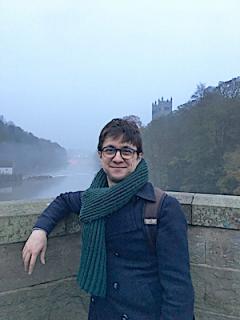
I am a scientist interested in the co-evolution of life and planetary environments across very large spans of space and time. I focus on the study of biosignatures in ancient materials relevant to the early Earth, Mars, and beyond. My work has discovered new traces of life in Earth's deep subsurface, new evidence of geochemical and biological processes relevant to early Earth and Mars, new forms of "false biosignature" that could mislead astrobiologists, and various new varieties and interpretations of fossils. I am Programme Director for Edinburgh's MSc in Astrobiology and Planetary Sciences, the first programme of its kind in the UK.
Member/Fellow: Higher Education Academy (FHEA), Royal Astronomical Society (FRAS), Geological Society of London (FGS, Palaeontological Association, Astrobiology Society of Britain, Council for the Defence of British Universities (Deputy Chair). Associate Editor of the International Journal of Astrobiology (Cambridge University Press). STEM Ambassador.
Background: I studied at Oxford (MEarthSci, St Edmund Hall), Aberdeen (PhD Geology), Birkbeck (BA Philosophy) and Edinburgh (PgCert Academic Practice). Other than Edinburgh I have worked at Yale University, Durham University (briefly), and NASA Ames (as an intern).
Postdoctoral scientists
Pamela Knoll, Human Frontiers Science Programme Postdoctoral Fellow

Pam Knoll (BS, PhD Florida State) is a physical chemist investigating biomineral selection by extremophile microorganisms.
Niall Rodgers, Postdoctoral Research Assistant

Niall Rodgers (MPhys Edinburgh, PhD Birmingham) is an applied mathematician investigating the application of neural networks and other computational methods to the discrimination of biological and non-biological shapes, objects and materials.
Phil Vixseboxse, Postdoctoral Research Assistant
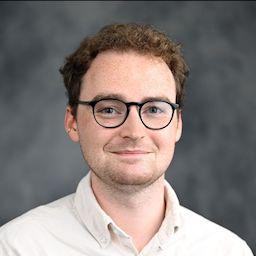
Phil Vixseboxse (PhD candidate, University of Cambridge) is a palaeobiologist interested in experimental taphonomy and the preservation of soft-bodied and microbial organisms.
PhD students
Beilei Hua
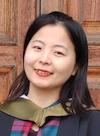
Edwin Rodriguez Dzul

Mylaine Holin

Mia Belle Parkinson

Mia (BA Harvard University, MScR University of Edinburgh) is investigating the astrobiology of simulated exoplanet reflectance spectra with funding from the highly competitive and prestigious NERC E4 doctoral training programme. By merging the two seemingly distant fields of exoplanetary astronomy and laboratory microbiology, Mia's research will provide a unique perspective of life on exoplanets and contribute to developing next-generation space-based instruments. Mia also maintains the excellent Tartan Tardigrade podcast. Her project is co-supervised by Beth Biller of the Institute for Astronomy.
External members
Sigrid Huld (PhD candidate, Uppsala University)
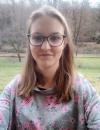
Lead supervisor: Anna Neubeck
Sigrid (BSc Pavia, MSc Uppsala) is researching the biogeochemistry of manganese and the production of self-organized pseudofossils on early Earth and Mars.
Cat Gillen (PhD candidate, Durham University)

Lead supervisor: Peter Vickers
Cat Gillen (BSc Durham, MA LMU) is a philosopher of science working on biosignature uncertainty in astrobiology.
Former members/alumn[ae/i]
Corentin Loron, Royal Society Newton Research Fellow (2022-2024)
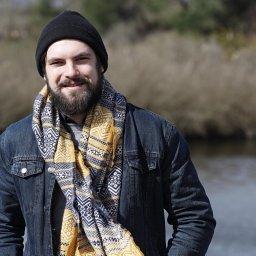
Corentin Loron (BSc Lille 1, MSc Uppsala-Lille-1, PhD Liège) investigated the oldest fossil fungi and their pathways of fossilization. He then achieved a Leverhulme Research Fellowship and has established his own group.
Susie Seddon-Cowell (MScR Palaeontology and Geobiology, 2023)
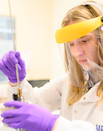
Susie (BSc University of York) investigated the fossilization of bacteria under extreme conditions. Susie then secured a PhD studentship in Mechanical Engineering at the University of Bath.
Melanie Podbielski (MScR Palaeontology and Geobiology, 2022)
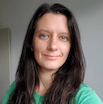
Melanie (BS Appalachian State University) investigated the fossilization of iron-oxidizing bacteria and compared them with iron-mineralized pseudofossils produced in the laboratory.
She then moved to NASA's Space Life Sciences Lab at the Kennedy Space Center for further research in space biology. Her project there investigated how microgravity impacts the immune response of plants in preparation for a flight experiment onboard the International Space Station. This work was part of a collaboration between NASA and the University of Florida.
In 2023 Melanie returned to Edinburgh to begin a PhD investigating the potential of sulfate reducing bacteria for the production of metal nanoparticles. This process could be used to remove contamination from lithium ion battery leachates and make battery recycling more sustainable, and may have applications for in situ resource utilization and biomining in space.
Elisha de Mello (Physics MPhys project student, 2019)
Elisha completed an MPhys research project entitled, "Hydrodynamic Forcing of Stromatolite Morphology" based on numerical modeling of the growth of organosedimentary structures. Elisha is now a PhD student at the University of Sheffield.
Sam Johnson (Theoretical Physics BSc project student, 2020)

Sam completed a Senior Honours Project entitled, "Numerical approaches to self-organization in agates" based on the numerical modeling of diffusive and layered growth structures in agates. Sam then moved to Gonville and Caius College, Cambridge to complete the MASt in Applied Mathematics (Part III of the Mathematical Tripos), before beginning doctoral work at the University of Oxford.
Lab mascot
Violet

Violet is researching the possible existence of squirrels in that tree. She is not allowed in the laboratories.

